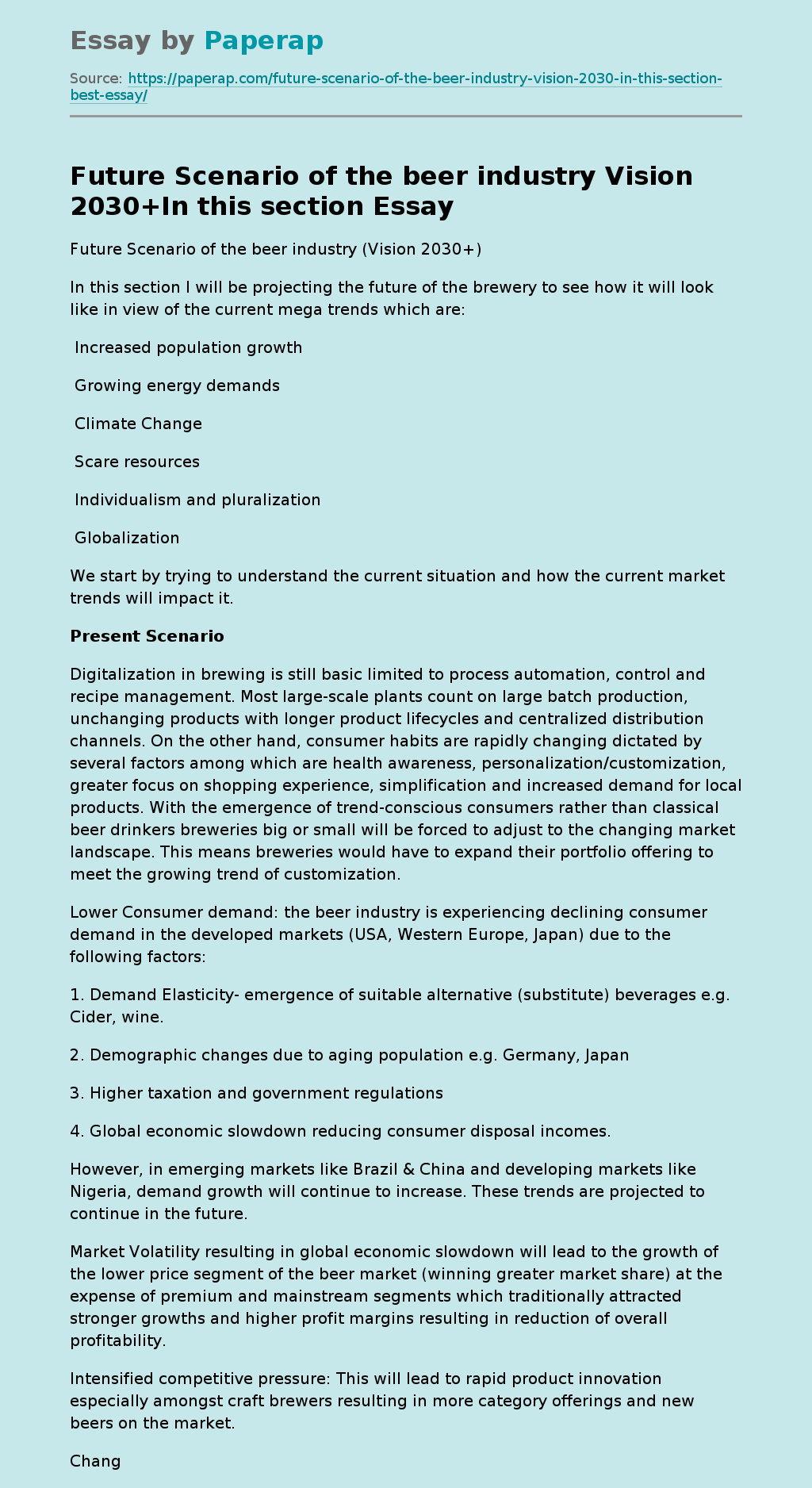Future Scenario of the beer industry Vision 2030+In this section
Future Scenario of the beer industry (Vision 2030+)
In this section I will be projecting the future of the brewery to see how it will look like in view of the current mega trends which are:
Increased population growth
Growing energy demands
Climate Change
Scare resources
Individualism and pluralization
Globalization
We start by trying to understand the current situation and how the current market trends will impact it.
Present Scenario
Digitalization in brewing is still basic limited to process automation, control and recipe management.
Most large-scale plants count on large batch production, unchanging products with longer product lifecycles and centralized distribution channels. On the other hand, consumer habits are rapidly changing dictated by several factors among which are health awareness, personalization/customization, greater focus on shopping experience, simplification and increased demand for local products. With the emergence of trend-conscious consumers rather than classical beer drinkers breweries big or small will be forced to adjust to the changing market landscape. This means breweries would have to expand their portfolio offering to meet the growing trend of customization.
Lower Consumer demand: the beer industry is experiencing declining consumer demand in the developed markets (USA, Western Europe, Japan) due to the following factors:
1. Demand Elasticity- emergence of suitable alternative (substitute) beverages e.g. Cider, wine.
2. Demographic changes due to aging population e.g. Germany, Japan
3. Higher taxation and government regulations
4. Global economic slowdown reducing consumer disposal incomes.
However, in emerging markets like Brazil & China and developing markets like Nigeria, demand growth will continue to increase.
These trends are projected to continue in the future.
Market Volatility resulting in global economic slowdown will lead to the growth of the lower price segment of the beer market (winning greater market share) at the expense of premium and mainstream segments which traditionally attracted stronger growths and higher profit margins resulting in reduction of overall profitability.
Intensified competitive pressure: This will lead to rapid product innovation especially amongst craft brewers resulting in more category offerings and new beers on the market.
Changing Consumer behavior. New patterns of consumer behavior will emerge driven by health & wellness, customization & personalization resulting in dietary preferences, and focus on shopping experience favoring local product purchase.
Distribution Challenges. Retail stores like supermarkets and large chain discounters/convenience stores will become important distribution channels for beer at the expense of traditional bars and pubs. There will be a surge in demand for small batch deliveries in various pack sizes to reduce warehousing costs and satisfy consumer requirements making order fulfilment rate to prevent stock outs a major KPI for the Breweries. Large batch distribution to a central wholesale customer may be unsuitable and obsolete.
Changes in Operational and Organizational structure. Due to rapid changes in consumer preferences, it is projected that it will lead to shift from stable product portfolios with longer product lifecycles to agile organizational structures which support swift and steady product launches with shorter product lifecycles. Traditional low cost manufacturing favoring large batch volumes will be unsuited for niche markets requiring smaller batches.
Future Scenario
To overcome the challenges posed by these trends, Breweries will invest massively in digitalization. New ways of manufacturing will be aided by digitalization to enhance productivity. Digital transformation will change the brewing industry as it experiences shorter innovation cycles. As sensors become less expensive and readily available, with closer integration in equipment, their utilization will gain traction in the brewing industry resulting in Digital Factory (Industry 4.0) with interconnected devices and processes to generate data for smart decision making. Breweries will have less production and maintenance staff with brewers and process engineers confined in a centralized location in front of the computer screen monitoring and controlling the entire process. Maintenance and troubleshooting activities will be outsourced to OEMS and equipment suppliers such as Endress+Hauser to harness their expertise for remote servicing.
Issues like cloud computing, small batch production, simulations using digital twins and documentations will take center stage.
Future Scenario of the beer industry Vision 2030+In this section. (2019, Dec 17). Retrieved from https://paperap.com/future-scenario-of-the-beer-industry-vision-2030-in-this-section-best-essay/

